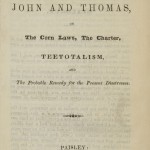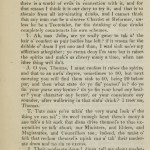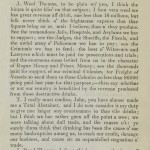Some of our chapbooks are less jovial and more philosophical. Published in 1842 at the beginning of the teetotal movement, here’s a dialogue between two men on the effects of the corn laws during famine in the 1800s. I’m not a historian, so I found some extra research on the topic to be pretty interesting. Even without the context, the arguments presented by John, the abstinent Christian reformer, as to how productivity and national debt are all entwined in the propensity for drink of the everyday man, are even more entertaining when read aloud in that delightful rural dialect:
T. Ah, noo John, are ye really gaun to tak a’ the hair o’ comfort us puir bodies hae left ? if it wasna for the dribble o’ dram I get noo and than, I wad sink un’er my affliction athegither; ye canna deny I’m sure but it raised the spirits and mak’s us cheery mony a time, when nae ither thing will do’t.
J. O yes, Thomas, I must confess it raises the spirits, and that to an awfu’ degree, sometimes to 80, but next morning you will find them sink to 40, being 20 below par, and then what state do ye fin’ yoursel’ in ? do ye fin’ your purse ony benter? do ye fin your head ony healer? your character ony better, or your conscience ony sounder, after wallowing in that sinfu’ drink? I trow no, Thomas.
For more dialogues to rival Socrates, like the Dialogue between John and Thomas, on the corn laws, the charter, teetotalism, and the probable remedy for the present disstresses, try The Bible of Divine Origin.



